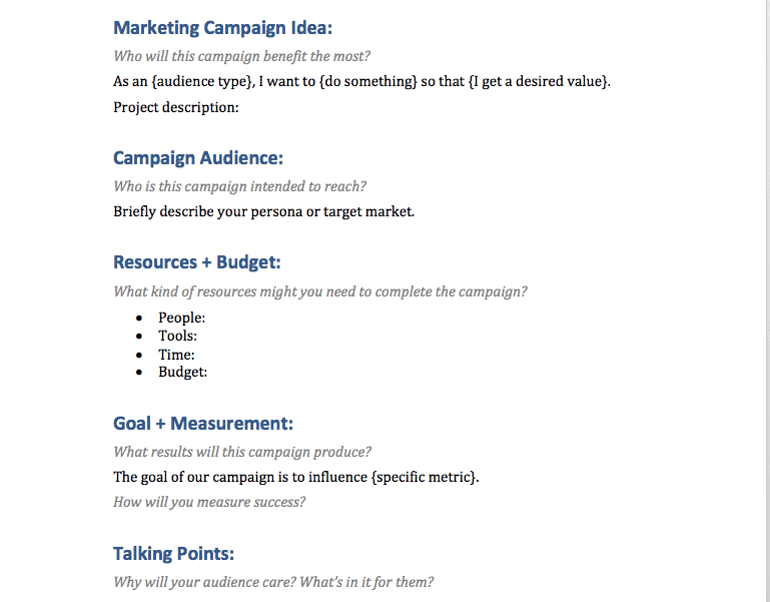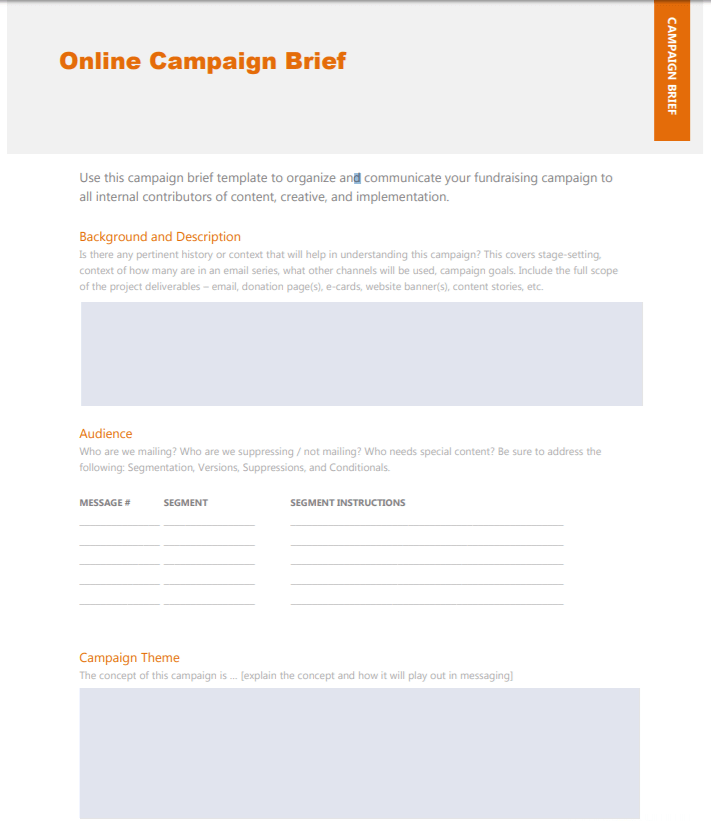It takes hard work, time, skills, experience and luck to run a successful marketing campaign. Your luck depends on the amount of time you spend planning the entire campaign. Planning is multifaceted and involves tools such as the marketing campaign brief template. The template gives the entire campaign – and planning – the much-needed direction. In addition to that, the template is the glue that holds everything together. It’s the closest you get to guaranteed success!

How does the brief guarantee success?
1. The marketing campaign brief template defines the marketing campaign
Many times, freelance marketers increase their chances of success by defining what the marketing campaign is. Getting the definition right should be the starting point at all times. Without it, everything else would collapse. The campaign itself cannot take off without a detailed definition. Additionally, it becomes hard to measure success or record milestones if the detailed definition was never in place. Fortunately, that is where the marketing campaign brief template plays a crucial role.
2. Prioritizing social media with the marketing campaign brief template
Social media is one of the most powerful marketing tools in the 21st Century. It offers the kind of access to clients that brands – both large and small – would never have dreamed of through traditional media. Most clients need help in using social media as part of their marketing campaign. The freelance marketer can only talk about it if the marketing campaign brief template already hinted at it. Most importantly, clients should give consultant marketers the right to delve into social media too.
It’s difficult to find a modern entrepreneur who is daring enough to ignore social media though.
3. Incorporating technology with the marketing campaign brief template
Technology forms a crucial cog of the entire marketing campaign. It’s necessary and essential to the success of the whole campaign. Technology provides a better understanding of the client’s needs, aspirations and unique situations. For example, you can use technology (analytics) to analyze what your followers on social media prefer reading, watching, or buying. You can then use this information to institute changes that reflect customer behavior. Technology can be critical in:
- Publishing more useful, interesting and engaging content
- Gaining more authority
- Increasing customer loyalty
- Enjoying increased exposure in your niche
- Tracking traffic to your website
4. Hosting real-life events with the marketing campaign brief sample
The consultant’s input – where the marketing campaign is concerned – doesn’t end in online spaces only. Instead, this input should be seen, felt, and experienced offline as well. To this end, the marketing campaign brief template should talk about organizing real-life offline events. The biggest benefit here is the client’s business is more humanized. Buyers can then relate with it at a personal level. Depending on the freelance client’s budget, you could also spend some money on experiential marketing.
Give customers a chance to see the face(s) behind your clients’ brands.

5. Introducing new ideas with the marketing campaign brief sample
All marketing campaigns carry a great level of creativity. In fact, the success of any marketing gimmick depends on the creativity of the consultant hired to carry it out. Creativity incorporates passing the right message across more effectively. Creativity may require new ideas too, especially where the old never produced the desired results. The consultant has to be ready to speak with the client’s team. Important people such as sales and product managers can provide more insight that propels the marketing campaign into more success.

6. The marketing campaign brief is perfect for managing expectations
All good consultants excel at managing expectations. Client expectations should never be beyond your control. It’s good for freelancers to find ways of staying on top of all situations. Use this template to set yourself apart as an honest freelancer. Use it for under-promising yet over-delivering. Use it for anticipating the needs of your clients even before they realize their own needs. Create space for constant communication with clients too using this document.
7. Simplify everything with the marketing campaign brief example
Complex solutions can create new problems for your consultancy. It’s important for you to learn how to overcome this issue. The first strategy is to make everything as simple as possible. One quality that the best freelancers have over everybody else is the ability to take complex situations and make them remarkably simple for clients. Give them an answer. Make the answer as simple and easy to understand as possible.
Simplifying a client’s problems doesn’t equate to underrating them, though. Do this while letting clients know that you’re not taking them or their issues lightly.
8. Motivating yourself with the marketing campaign brief example
Freelancers have to motivate themselves to work on the issues that clients bring to them. A good consultant knows the importance of good motivation. It’s not impossible to find ways of motivating yourself, as a consultant. The motivation keeps you going on days when you don’t feel like working. It encourages you to put in a proper shift when everything else seems lost and uninteresting.
The campaign brief template can act as a powerful tool for motivating yourself too.
9. Display consistency with the marketing campaign brief template
Be consistent in all your freelance relationships with clients. Be consistent in delivering quality to the clients. The consistency is a hallmark of all successful consultants. Clients love consistent freelancers. Do not give awesome A+ service only once. Instead, do it every time. Let your customers know that they can and should expect consistently excellent products and services from you every time. Otherwise, they would be disappointed.
Whatever you do, you should never keep your clients waiting in line forever.

10. Learning to listen with the marketing campaign brief template
Additionally, it’s important to learn how to listen to your clients. Listening helps you to get what they are trying to say. More importantly, listening offers you a window into their needs and expectations. You can then go beyond what they expect and deliver stellar product or service based on the information you gleaned after listening to them. Listening also proves that you respect your clients and take everything they tell you seriously.
You’re more likely to learn something new about your clients by listening to them. You also increase your chances of learning something new about the project by listening.
As you have already noted here, the campaign brief template is a wonderful document to use. It offers you more benefits than you will ever realize. The tool is powerful for growing a freelance business that stands heads and shoulders above its competitors. It boosts your freelance business. It pushes you to treat your clients in a way that allows you to exceed their expectations.
Use the campaign brief template to build a consultancy that exceeds customer expectations.
Remember to continue learning new lessons. Keep track of all aspects of the existing or new marketing campaign. Measure and record milestones too. Freelance marketers have to work closely with their clients to ensure that everything flows smoothly. Take cognizant of all the pointers listed here. Most importantly, do not embark on any new project without drafting an excellent marketing campaign brief template. Use the template to guide the entire campaign from start to finish while involving the clients every step of the way.





